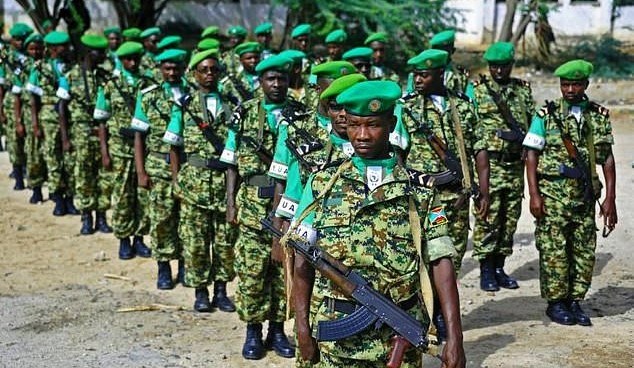
Wednesday February 26, 2025

Burundian peacekeepers serving under the African Union Transition Mission in Somalia (ATMIS) stand in formation during a military drill in Mogadishu. The withdrawal marks the end of an 18-year deployment as Somalia moves toward assuming full control of its security operations.
Mogadishu (HOL) — Burundi has officially begun withdrawing its troops from Somalia, ending an 18-year deployment under the African Union’s peacekeeping missions. The move follows a dispute over troop contributions to the newly formed African Union Support and Stabilization Mission in Somalia (AUSSOM), which replaced the African Union Transition Mission in Somalia (ATMIS) on January 1, 2025.
The Burundian contingent, which played a major role in Somalia’s security since 2007, was denied its request to deploy 2,000 troops under AUSSOM. Instead, Somalia allocated only 1,041 slots to Burundi, far below its expectations. The decision prompted sharp criticism from Burundian officials, who accused Somalia of betrayal and ingratitude despite Burundi’s long-standing contributions to the fight against al-Shabaab militants.
Burundi was one of the earliest contributors to AMISOM, deploying over 5,500 troops at one point, making it the second-largest contingent after Uganda. Burundian forces were instrumental in securing strategic areas, including Mogadishu’s Ministry of Defense headquarters, and were involved in major operations to push al-Shabaab out of key strongholds.
However, their role has become increasingly scrutinized in recent years. Somali officials questioned the effectiveness of Burundian forces and raised concerns over allegations of financial mismanagement and reported collusion with militants. The relationship between the two governments deteriorated, further strained by accusations of corruption among Burundian officers and reports of embezzlement of peacekeeping funds.
During their 17-year deployment, over 1,000 Burundian soldiers were killed in combat, with many others wounded or captured. Despite these sacrifices, Burundian diplomats felt slighted by their exclusion from AUSSOM, with one senior official telling Ugandan media, “We have witnessed betrayal and ingratitude from Somalia despite the immense sacrifices we made.” Burundian diplomats even demanded an official apology from the Somali government.
Somalia, however, defended the decision as a necessary step toward greater sovereignty in its security operations. Somali Foreign Minister Ahmed Moalim Fiqi acknowledged Burundi’s contributions but stated that the transition to AUSSOM prioritizes a more streamlined and Somali-led security framework.
Burundi’s departure raises concerns about potential security vacuums, particularly in areas where its forces played a key role in counterterrorism operations. To fill the gap, Uganda has pledged to increase its troop deployment under AUSSOM, while Egypt has committed 1,091 personnel, marking its first direct involvement in Somalia’s security efforts.
The transition to AUSSOM reduced the overall AU troop presence from 20,000 under ATMIS to 12,626, including 1,040 police officers. To mitigate risks, Somalia has secured bilateral agreements to deploy an additional 11,000 troops to sustain counterterrorism efforts and stabilize areas reclaimed from al-Shabaab.
Meanwhile, Burundi has turned its focus elsewhere, with many of its troops expected to be redeployed to eastern Congo, where they are engaged in operations against the M23 rebel group. This shift underscores the competing security priorities of AU member states and signals a broader recalibration of regional peacekeeping commitments.
Burundi’s withdrawal is not the only challenge facing AUSSOM. Ethiopia’s participation in the mission was initially uncertain due to diplomatic tensions with Somalia, primarily stemming from Ethiopia’s controversial Memorandum of Understanding (MoU) with Somaliland for access to a Red Sea port. Somalia insisted that Ethiopian troops would be excluded from AUSSOM unless Addis Ababa annulled the deal. However, the two nations restored formal ties following Turkey-mediated talks that led to the Ankara Declaration in December 2024. This diplomatic breakthrough paved the way for Ethiopia’s inclusion in AUSSOM, with both governments later signing a Status of Forces Agreement (SOFA) in early 2025 to formalize Ethiopian troop deployment under Somalia’s authority.
The African Union, alongside international partners, continues to push for stability in Somalia, but regional rivalries and security concerns present significant hurdles to the success of AUSSOM.
Despite the diplomatic fallout, Somalia remains committed to assuming complete control over its security. Somali officials argue that AUSSOM provides an opportunity to restructure its defence strategy by integrating international support with a more capable and self-sufficient national army.
“The focus is on building a professional, self-reliant force that can safeguard Somalia’s future without long-term dependence on foreign troops,” a Somali government official stated.






